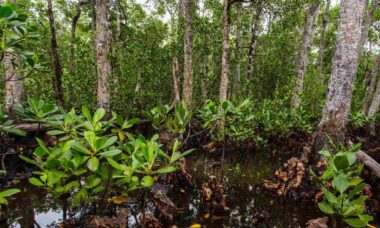FOR IMMEDIATE RELEASE
8 December
2023 WILL BE the hottest year on record, according to the Copernicus Climate Change Service, with the official declaration made weeks before the year’s end. The broken record comes as a heatwave scorches large swathes of the country, threatening to push temperatures into the 40℃s in Sydney.
Rising pollution from burning coal, oil and gas is overheating our planet and worsening extreme weather events like bushfires, heatwaves and droughts.
Today and over the weekend, extreme temperatures will put Australian lives at greater risk. More Australians die as a result of heatwaves than from bushfires, cyclones, floods, and severe storms combined.
Dr Simon Bradshaw, Director of Research at the Climate Council said: “The stark reality of the climate crisis is that it threatens the health of the people and places we love. It worsens extreme weather events like heatwaves and makes fires more likely, and more severe.
“Heatwaves are silent killers. The human body can only cope with so much and it’s critical that today and over the weekend, Australians heed the advice of their local health authorities, stay vigilant and look after each other.
“This ferocious heat, and the confirmation that this year is the hottest on record is consistent with what science has warned us to expect. That same science tells us that if we do not act swiftly, things will only get much worse.
“If we continue to recklessly burn more coal, oil, and gas, heatwaves will become so extreme that some parts of the country will become effectively uninhabitable. We can’t keep stoking the fire if we want the room to cool down.”
Major General Peter Dunn, member of Emergency Leaders for Climate Action and former Commissioner for the ACT’s Emergency Services Authority said: “Australians watched as those living in the northern hemisphere sweltered through repeated heatwaves earlier this year, anxiously awaiting the arrival of our own.
“Extreme heat, like what we’re seeing today and over the course of the weekend, not only makes any fires that ignite burn hotter and harder, it also overwhelms the ability of our emergency services to cope. On the worst days, there are just too many fires to fight and it is unsafe for first responders.
“Not everyone has access to liveable housing under such extreme conditions. Communities must be equipped in a way that helps everyone survive extreme heat - things like cool refuges and access to community halls - and helps them get prepared for the fire season.
“Climate change is devastating communities now, and we cannot afford to keep adding fuel to the fire. It is well and truly time that Australia left polluting fossil fuels in the ground.”
ENDS
For interviews please contact the Climate Council media team on [email protected] or 0485 863 063, or Lydia Hollister-Jones on 0448 043 015 or [email protected]
About us:
The Climate Council is Australia’s leading community-funded climate change communications organisation. We provide authoritative, expert and evidence-based advice on climate change to journalists, policymakers, and the wider Australian community.
For further information, go to: climatecouncil.org.au
Or follow us on social media: facebook.com/climatecouncil and twitter.com/climatecouncil


